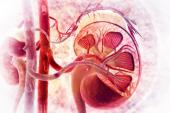Renal Denervation May Help Cut BP Meds, Sham-Controlled Trial Hints
There was more spironolactone in the sham arm, RADIANCE-HTN TRIO showed. But follow-up was short and numbers were small.

ORLANDO, FL—For patients who still had uncontrolled blood pressure after 2 months in the RADIANCE-HTN TRIO trial, additional BP reductions were achieved by 6 months using a standardized, stepped-care antihypertensive regimen, with fewer medications needed in the renal denervation versus sham control arm, according to results presented here at TCT 2021.
Average ambulatory and office BP at 6 months was comparable in patients who had undergone ultrasound-based denervation with the Paradise system (ReCor Medical) and those who had received the sham procedure (with lower home BP in the denervation arm), but those in the denervation arm didn’t require the addition of as many medications from baseline (mean 0.7 vs 1.1; P = 0.045).
Aldosterone antagonist therapy—specifically, with spironolactone—was added in a significantly smaller proportion of patients undergoing denervation (40.0% vs 60.9%; P = 0.017), Ajay Kirtane, MD (NewYork-Presbyterian/Columbia University Irving Medical Center, NY), one of the course directors of the meeting, reported.
Kirtane told TCTMD, too, that lower doses of spironolactone were prescribed in the denervation arm, which is important because the drug does come with some side effects, like gynecomastia in men.
The findings offer a glimpse at what it might look like to use what one commentator called a new pharmacoinvasive approach to managing hard-to-treat hypertension, and reinforce what has become apparent as renal denervation research has progressed in recent years: that the procedure serves as a complement to and not a replacement for good medical therapy and healthy lifestyle behaviors.
“The fact that we were able to achieve these [BP] reductions with lesser medication added back I think does support continued effectiveness of denervation out to 6 months,” Kirtane said, noting that similar findings were observed in an analysis of the RADIANCE-HTN SOLO trial.
Asked whether the lower drug burden is enough to justify undergoing an invasive intervention like renal denervation, Kirtane said it depends on the individual patient and brought the focus back to the mainstays of hypertension management. “We need to be genuinely offering good lifestyle modification and medical therapy to our patients. This is not something where I would advocate we go out and just start denervating everybody,” he said. “We have to be good clinicians with hypertension control.”
But despite best efforts at getting patients to change their lifestyles and adhere to effective medical therapies, BP often remains uncontrolled, “and if we have a therapy that’s effective in that patient population, like denervation, then that certainly would be an option for those types of patients,” Kirtane said, adding that evidence shows it’s a safe procedure.
This is not something where I would advocate we go out and just start denervating everybody. Ajay Kirtane
Commenting during a media briefing, David Kandzari, MD (Piedmont Heart Institute, Atlanta, GA), said “these are welcome findings because they add to the totality of the evidence with renal denervation suggesting, at least in this instance, intermediate-term durability with renal denervation and also the opportunity to reduce the medication burden, both of which . . . [are] of increasing importance to our patients.”
The possibility of reducing the number of medications “is one of the key drivers for patient motivation for an alternative therapy, a nonpharmacologic approach like renal denervation,” he said. Patients don’t usually want to undergo an intervention, he added, “but if there is durability with it and if there is a meaningful reduction in blood pressure—which interestingly by patients’ criteria, it doesn’t have to be that large of a reduction in blood pressure to be meaningful for them—and the opportunity to reduce medicines, then it’s clinically important to them.”
Intensifying Medical Therapy
The RADIANCE-HTN TRIO trial included 136 patients with uncontrolled BP despite use of at least three antihypertensive medications (the average was four at baseline). For the trial, all patients were switched to a fixed-dose combination pill containing three medications—a calcium channel blocker, an angiotensin receptor blocker, and a thiazide diuretic—and those who continued to have uncontrolled BP after 4 weeks were randomized to denervation using the Paradise system or a sham procedure.
As reported earlier this year, the main results of the trial showed that renal denervation led to a 4.5-mm Hg greater reduction in daytime ambulatory systolic BP (the primary endpoint) at 2 months compared with sham control, with high medication adherence in both groups.
For this new analysis, the fact that patients and physicians remained blinded to treatment assignment from 2 to 6 months allowed investigators to assess potential differences in the implementation and effects of a standardized, stepped-care medication escalation protocol for patients whose BP remained uncontrolled. Patients were evaluated monthly during that period, and if BP was still high, additional medications were added. The first escalation step involved use of spironolactone, with other drugs added sequentially if needed.
At 6 months, the average number of antihypertensives used was not significantly different between the denervation and sham groups (3.8 vs 4.1; P = 0.078), although the average number of medications added was lower in patients who had received denervation, stemming from less use of spironolactone. Medication adherence remained high in both groups.
Looking at achieved BP levels at 6 months, patients in the denervation versus sham arm had a 4.28-mm Hg greater average reduction in home readings after adjustment for baseline BP and number of medications taken (P = 0.027), although office and ambulatory readings were statistically similar.
Though the proportion of patients achieving BP control was numerically higher in the denervation group, the difference was not significant. Kirtane pointed out that even though patients were assessed regularly, control rates remained below 50% in the trial. “This is sobering data,” he said.
Kirtane reported that safety was comparable in the two trial arms.
A Pharmacoinvasive Approach to Hypertension?
During a panel discussion at the media briefing, moderator Roxana Mehran, MD (Icahn School of Medicine at Mount Sinai, New York, NY), stressed that that RADIANCE-HTN TRIO is not a definitive trial and that it’s challenging to tease out whether there was a true effect of renal denervation, especially considering the medication changes between 2 and 6 months.
Kirtane acknowledged that the analysis is not definitive. “It’s certainly exploratory, but this is a combination way that we have to treat our patients,” he said. “Resistant hypertension is a bad disease. You can’t control all these patients, and so we need to use everything at our disposal to try to help them.”
“I’m not so sure that we have proven durability here with the small numbers of patients in this trial, but I think it’s a very exciting next step and to me it’s opening a window,” Mehran said. “Previously the doors might have been closed for renal denervation. I think the window is opening, and it may be a large one.”
To TCTMD, Kirtane made it clear that renal denervation should be seen as complementary to other approaches. “For clinicians, it’s pretty clear that lifestyle modification and many effective medicines—that are cheap, too—can work, but I think the question is: who do these things work together [in]?”
The effectiveness of renal denervation for lowering blood pressure is not really in question anymore based on the sham-controlled trials completed in recent years, he said, adding that there is a need for additional studies in larger numbers of patients to ensure that the procedure is safe before rolling it out in practice.
“I think it’s more a question of how do we select the appropriate—and I really want to emphasize the word appropriate—patients for whom this might be an effective way of controlling their blood pressure,” Kirtane said.
Mehran told TCTMD that “if you’re going to have a nonadherent, noncompliant patient who’s not going to want to stay on three meds, maybe this is a way [to treat them]—a combination of medical management with renal denervation. But is this the definitive trial that shows it? I don’t think so.” In particular, she said, at 6 months “you start to see the loss of that major reduction in blood pressure” with denervation.
Thus, additional research is needed to study how renal denervation can fit in with other approaches to treating hypertension, Mehran said. “Nonetheless, hypertension is the number one risk factor contributing to deaths from cardiovascular disease, so it’s really important to get blood pressures under control.”
Todd Neale is the Associate News Editor for TCTMD and a Senior Medical Journalist. He got his start in journalism at …
Read Full BioSources
Kirtane A. Six-month outcomes of a randomized trial of renal denervation versus a sham procedure: blinded medication titration for resistant hypertension in the RADIANCE-TRIO trial. Presented at: TCT 2021. Orlando, FL. November 4, 2021.
Disclosures
- Kirtane reports institutional funding to Columbia University and/or the Cardiovascular Research Foundation (CRF) from Medtronic, Boston Scientific, Abbott Vascular, Amgen, CSI, Siemens, Philips, ReCor Medical, Neurotronic, Biotronik, and Chiesi. In addition to research grants, institutional funding includes fees paid to Columbia University and/or CRF for consulting and/or speaking engagements in which Kirtane controlled the content. Kirtane also reports consulting from IMDS and receiving travel expenses/meals from Medtronic, Boston Scientific, Abbott Vascular, Abiomed, CSI, Siemens, Philips, ReCor Medical, Chiesi, OpSens, Zoll, and Regeneron.
- Mehran reports grant support/research contracts (institutional) from Abbott Vascular, AstraZeneca, Bayer AG, Bristol-Myers Squibb, CSL Behring, Daiichi-Sankyo/Eli Lilly and Company, Medtronic, Novartis Pharmaceuticals, OrbusNeich, CERC, Chiesi, Concept Medical, Applied Therapeutics, Beth Israel Deaconess, Zoll, Arena, Biosensors, Boston Scientific, CellAegis, Insel Gruppe AG, Philips, and Transverse Medical; consultant fees/honoraria/speakers bureau fees (personal) from Medscape/WebMD, Janssen Scientific Affairs, Cine Med Research, ACC, CIRM, SCAI, and WebMD; equity < 1% (personal) from Elixir Medical, Applied Therapeutics, and STEL; equity < 1% to her spouse (personal) from ControlRad; advisory board payments (institutional) from Idorsia Pharmaceuticals; scientific advisory board payments (personal) from the AMA; consultant fees/honoraria/speakers bureau fees (institutional) from Abbott Vascular, Abiomed, AM-Pharma, Alleviant, Bayer, Beth Israel Deaconess, CardiaWave, CeloNova, Chiesi, Concept Medical, DSI, Duke University, Idorsia Pharmaceuticals, Medtronic, Novartis, and Philips; divested equity < 1% (institutional) from Claret Medical (now Boston Scientific); and scientific advisory board payments to her spouse (personal) from Biosensors.
- Kandzari reports equity/stock(s)/options (personal) from Biostar Ventures; grant support/research contracts (institutional) from Medtronic, Teleflex, Abbott Vascular, CSI, and Biotronik; and consultant fees/honoraria/speakers bureau fees (personal) from CSI.





Comments